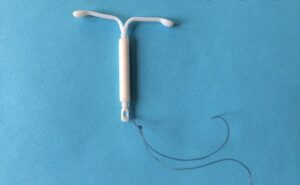During your period, staying active may seem less inviting, especially if you’re dealing with cramps or a heavy flow. In fact, according to a Strava and FitWoman survey, 69% of women change their workout routines during their period. But did you know that getting exercise can help you find some temporary relief?
We get that a heavy flow can be challenging when you exercise. After all, the last thing you want is to spot a leak mid-workout. Still, we’d hate for your period to control your life. So check out our suggestions for staying active: all month long.

Keep in mind, an extremely heavy flow could be a sign of a problem. In fact, long heavy periods are common when you have fibroids. Now, the only way to stop fibroid symptoms is to actively treat your fibroids. Still, while you’re researching treatment options, exercise can help alleviate some of your monthly discomfort.
In order to avoid embarrassment while staying active, consider the following suggestions:
1. Wear darker workout clothes, so any leaks will be less obvious. While we’re all about the white dress project, we also support practicality.
2. You may need to double up on protection: consider a tampon and panty-liner combination.
3. Think about shorter workouts, or staying close to home, so you can refresh your feminine products right after your exercise is complete.
So, these tips can help you stay active in the short term. And that’s important, as we’re about to reveal the benefits of exercising during your period. But we can’t emphasize enough that, in the long-term, you’ll feel more free to live your life if you find a lasting cure to your fibroid symptoms.
Have you ever experienced that runners high? Or walked away from a sweaty workout with a huge grin? As it turns out, there’s a scientific explanation for this phenomenon. When you exercise, your body produces endorphins, chemicals that target pain and boost your mood. For that reason, taking a brisk walk or jog could offer period pain relief that’s superior to over the counter meds.
Want the biggest endorphin rush? Choose cardio-based workouts like swimming, biking, running or even walking. Not your jam? No problem! Other forms of exercise, especially workouts like yoga that help calm your spirit, are also very effective.
Just keep in mind, you should always consult your healthcare provider before starting a new workout routine. This is especially true if you have fibroids and anemia, a common side effect of prolonged heavy periods. And remember, if you have fibroids, high intensity workouts during your period could be painful. That's because HIIT workouts direct blood flow to your vital organs. But that means your fibroids have a lower supply of blood, at least temporarily. Which could translate to increased pain while you're getting your sweat on.
Inverted yoga poses could also cause trouble on your period. So during that time of the month, take a pause from your shoulder stands, headstands and plough pose. Because when you stay upside down, your pelvic blood vessels get congested. And that can make your flow heavier than it already is.
Some other exercises may worsen fibroid-related period symptoms like cramps and pelvic pain. If you have these symptoms, steer clear of crunches and squats during your period. They can magnify your pain and make it harder to get through your cycle.
Other than these exercises, we're all about staying active during your period. And, to help you feel comfortable while you move? Make sure to pick the best protection for women with heavy periods.
 Flows?
Flows?We all know that heavy flow tampons and pads can fail. On your heaviest flow days, you may go through a super tampon as quickly as an hour. And that’s a major pain, especially when you want to stick to your regular exercise routines. Ready for something different? You may want to explore the menstrual cup, a relatively new product that come in different sizes, offering customized protection. When your period is average, they last for up to 12 hours (a typical cup holds about 20ml.) Naturally, if your flow if heavier, you’ll need more frequent cup changes.
When it comes to menstrual cycles, every woman is different. What’s normal for your sister may seem heavy to you. So, we’ve developed a few guidelines to help women identify problematic period symptoms.
First and foremost, if your period gets in the way of your lifestyle, that’s no good. Especially if your flow prevents you from healthy activities like exercise. So, if your monthly cycles keeps you stuck to your couch or tied to a nearby bathroom, we invite you to schedule a fibroid consultation with one of our Houston-area specialists.
And, even if your period isn’t interfering with your daily life, take note of major changes in your cycle. If your period suddenly becomes longer, heavier or more painful, this could indicate a problem like fibroids. We always recommend addressing fibroids early on. Why? Untreated fibroids can keep growing. Which is a problem, since larger fibroids can be harder to address.
At the end of the day, we want you to live your best life. And that means getting active when you want, without fearing major period problems. So if fibroids are getting in the way of your every day, it’s time to explore your treatment options. Just be sure to do your research, and explore minimally invasive treatments like Uterine Fibroid Embolization (UFE.) Remember, not every woman with fibroids will need to have surgery!
Sources: Live Strong, USA Fibroid Centers
As leading fibroid specialists in Houston, we can help you get back to doing the things you love – free of pain and symptoms associated with this diagnosis.

Scheduling
Please contact our dedicated specialists to schedule a consultation today.
2025 Houston Fibroids. All rights reserved. Website Design by Healthcare Success